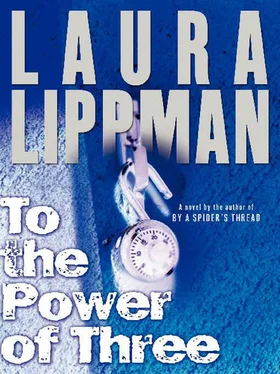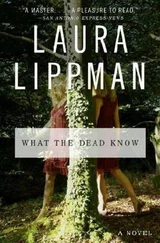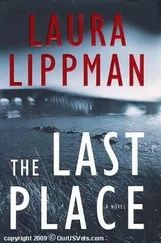She stood up, brushing the dirt from her jeans. What would it be like, she wondered, to cut class and meet a boy, instead of just smoking cigarettes with Val and Lila? She didn’t want to give them up, but it would be nice to have their companionship and a boyfriend. A boy who really liked her, a boy who wouldn’t think of her as the girl on the bus, who might not even know about that. Someone who looked like Peter Lasko, with his dark hair and green eyes. She hoped he was doing okay. He would probably go to the funeral, being Kat’s former boyfriend and all. She wondered if he would sing again.
“Are either of you going to the memorial service?” she asked her friends.
“Sure,” Val said. “It means missing the last three periods.”
“We could say we’re going, then just cut,” Lila said.
Eve waited to see what Val would decide. The thing was, she wanted to go to the funeral, although she couldn’t say why. It just seemed like one of the few all-school events where everyone was truly welcome, where everyone belonged. Unlike pep rallies, for example.
“That would be in bad taste,” Val decreed. “If we say we’re going to go, we should go. I’ll get permission to drive us there, though, instead of going on the buses. Then we can hang out in Baltimore after. Who’s going to complain?”
Eve thought of her dour father, who objected if she was even a minute late for supper, which they ate at six o’clock sharp. But it was Kat Hartigan’s funeral. Her mother would explain to him that such a circumstance merited an exception.
Back when Lenhardt was coming up,he had a sergeant, Steve Waters, who was about as good a murder police as anyone he had ever known. Waters was unflappable, nothing got to him. Except for one suspect, who was brilliant in his stupidity. Although the guy’s story was implausible, it wasn’t impossible, and he stuck to it with unwavering conviction, refusing every opportunity to change it even a bit. Waters finally lost it, just lost it, screaming into the guy’s face, then running out of the interrogation room and punching a Coke machine, accomplishing nothing but a broken hand.
It was a funny story-when it was happening to someone else.
Not so funny when the stubborn subject with the monotone voice was key to one’s own case. Less funny when one considered she was a teenage girl. Josie Patel wasn’t a genius. She wasn’t even a particularly skilled liar. But two hours into his second interview with her, Lenhardt was more than ready to assault a vending machine. Whenever challenged on her inconsistencies, she simply said, “Well, that’s the way I remember it. But it happened so fast.”
“Tell me again. Tell me what you do remember.”
And she did. She told it again and again and again, and she always told it the same way. Perri Kahn came into the bathroom where Josie and Kat were primping. “Why there?” Don’t know, Kat said she wanted to go there. “Why?” She didn’t say. Perri Kahn came in, shot Kat, shot Josie in the foot during a brief struggle, shot herself in the head.
“Was-is-Perri right-handed or left-handed?”
“Right-handed.”
“Yet the injury is to your right foot.”
She didn’t jump in, the way some subjects might. Where an adult man or woman might feel obligated to explain or account, she offered nothing. She didn’t have the nervous citizen’s tendency to be helpful or the too-smart perp’s compulsion to explain. She was, in fact, like a kid stuck on a teacher’s question, a kid who just stared back, waiting for the teacher to provide the answer out of frustration.
“See, Perri Kahn was right-handed. She’d be more apt to shoot you in your left foot. And she’s tall, which should have affected the trajectory. But your X-rays show a pretty straight entry, before the bullet glanced off this one bone here.”
He held up the X-ray, and not for the first time. Josie inspected it with interest but said nothing.
Gloria Bustamante, never particularly patient, was beginning to boil over. “Are you suggesting my client shot herself in the foot? That’s ridiculous. She has an athletic scholarship to the University of Maryland, College Park, which such an injury could void.”
Lenhardt chose not to respond to Gloria’s challenge, keeping his focus on Josie. Gloria had to be in the room, but nothing required him to acknowledge her.
“As you know, Josie, we took your blood today. We’ve also taken your fingerprints. Are those going to match any of the prints we found on the gun?”
“But I told you,” Josie said, “I tried to grab the gun. I almost got it, too. So of course my fingerprints are on it.”
“And you were shot while you and Perri struggled?”
“No. I tried to grab the gun. I almost got it. She yanked it back, out of my reach. Then she shot me.”
“So when the gun went off, your hand wasn’t anywhere near it?”
Josie nodded, even as her lawyer smirked. Gloria knew it was a.22, so even if they had tested Josie, it wouldn’t have mattered. They could never prove she had fired the gun, and she had a somewhat plausible explanation for why her fingerprints were on it. The only reason he had asked her to submit to a test was to see how panicky she would get at the suggestion. Very, in Lenhardt’s opinion.
“Did you see Perri shoot herself?”
The girl nodded, her eyes beginning to fill with tears. She always misted up at this point in the story.
“Show me where she held the gun, Josie.”
She started to shake her head, as if the scene were too graphic to confront in her memory, but then relented. “Here.” She aimed at her own temple with an outstretched index finger.
“Yet the bullet goes into her cheek, an upward angle.”
Josie Patel nodded.
“You see, what you’re saying doesn’t match.”
“It’s how I remember it,” she said. “I’m not saying my memory is perfect, though. I could be wrong about stuff. Ms. Cunningham once told us that about sixty percent of all eyewitness identifications are false.”
“Ms. Cunningham?” Lenhardt echoed, even as his brain provided the information a beat late- the fluffy little blonde .
“She’s a guidance counselor, but she also teaches a couple of classes on-well, I’m not sure what they’re on, really. Language. Communication. I just did the mandatory sessions, but Perri did two independent studies with her.”
This was the longest unbroken sentence the girl had uttered so far, and the only new piece of information. Worthless, but new.
“Tell me again, Josie. Tell me again.”
And she did, in just the same way, in almost the exact same words. It was not that she was rehearsed, although there was a rote quality to her statements. It was more that she had a teenager’s knack for stonewalling and the shrewdness not to overreach. If she had come in without a lawyer, Lenhardt knew he could have broken her down, told her made-up stories about Perri Kahn regaining consciousness and asking for Josie Patel’s forgiveness. Or he could show her the letter, which was in fact from Perri Kahn, and bluff her, say they knew the “truth” to which Perri alluded. Heck, he’d use the old trick of pretending the photocopier was a lie detector machine, although that had lost some of its punch since it had been re-created on national television. Under Gloria Bustamante’s eagle eyes, he didn’t dare try such tricks.
“Josie, was there someone else there? In the stall?” He had asked this before, of course.
“No. It was just the three of us.”
Her response, although also consistent, always seemed a fraction too quick, like someone slamming a door shut. Okay, he’d let that go for now. He had been promised fast results on the blood, so he’d pull her back in a day or two on that pretext. He thought about telling her that they thought a fourth girl might have been there, watching everything unfold from behind that locked stall door, but he didn’t want Gloria to get that bit between her teeth. At this point rumors of a fourth girl only helped Perri Kahn’s lawyer.
Читать дальше












